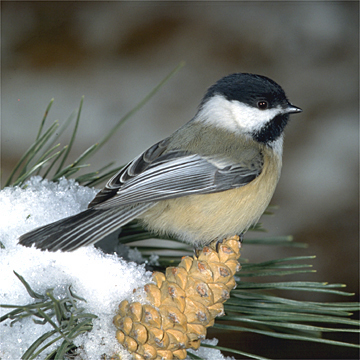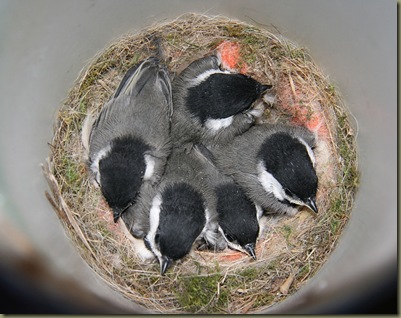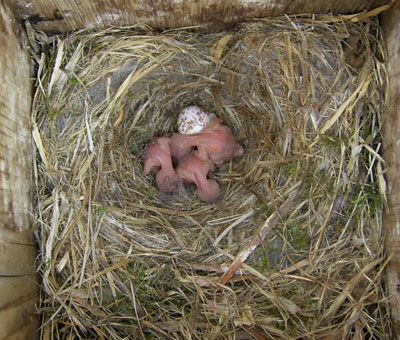
CHICKADEE.
High in the bare brown elm he swings,
And twitters low and sweet;
What cares he that the winter snow
Lies white beneath his feet?
December is better than Mays and Junes
For singing the sweetest of sweet tunes,
Chickadee dee dee dee.
Where are the wife and babies brown?
Where does the wee nest hide?
For trees are bare and leaves are down,
And all the country-side
Lies shrouded in the drifting snow;
But he sings though bitter north winds blow,
Chickadee dee dee dee.
The night shuts down with bitter cold;
Men shiver, hurrying by;
But when morning breaks in purple and gold,
Clear 'gainst the eastern sky,
We see the dainty figure swing,
And hear again the sweet notes sing,
Chickadee dee dee dee.
Annie M. Libby.

OUR BIRDS.
VIEVA and Freddie wish me to tell you about our chickadees. They come to our sitting-room window many times every day to get the crumbs of "Johnny-cake" which we lay upon the window-seat inside.
Accidentally (in connection with the first appearance of the birds, this season), a corner of one of the lower panes of glass was broken out. We have left it unreplaced for the especial accommodation of the birds; and they pass in and out many times a day at their leisure.
Sometimes there are three in the room flying about at a time. Some of them are so tame, they sit on our hands to eat; but if a stranger is in the room, they are very shy, seizinga crumb and retreating as quickly as possible.
They (or others just like them) come in this way every winter, and seem to depend upon us for their food. As summer approaches, they cease to come into the house, but often sit on the apple-tree over the well at the kitchen door, and call "chick-a-dee." When we go out and speak to them they sometimes hop down quite near, and seem much pleased.
Vieva and Freddie think it is better than to have a bird in a cage. Don't you? There is a verse in the Bible, which shows that God cares for even so small a thing as a little bird. Can you tell where it is?
MARY MARTIN.


CHICKADEE-DEE.
CHICKADEE—chickadee-dee--oh, look at
the dear little snow-bird, mamma! See
how he hops about, and keeps on with his
chirping all the time, and don't seem to
care a bit for the snow. I do believe I can almost tell what he is saying."
"What is it, Kitty?"
"Oh, he says, 'Chickadee-dee-dee, look at me, look at me,—won't you give me a few crumbs, little girl? It is cold and all snow, and the wind is blowing, but I am singing chickadee-dee-dee, don't you see all the time, for snow-birds always get taken care of, you know ; and I know who takes care of me, me, me, so I just keep on singing chickadee-dee-dee.' " Mamma laughed as Kitty ran for some crumbs.
"I think that's a pretty good bird-song," she said.
"That isn't what he says to me," said Tom.
"He says: Hurrah, boys, snow, and more coming. Hurry up, hurry up—get out your sleds
and skates, and try the coasting and the ice—
build snow-forts, pitch snow-balls, and have a regular jolly old jigamaree-ree-ree-ree-ree.' See how
the saucy little fellow nods his head at me, as if to say `You're right, my boy—that's exactly what I'm saying; so you may open the window, and let Kitty throw out those crumbs to me, me,
me:' Now, Kitty." Tom softly raised the sash, and Kitty threw out her crumbs.
"There—he's frightened!" Master Chickadee flew to the top of a trellis near by, and stood looking down out of his bright eyes, giving several quick little notes.
"Now he 's saying: Let me see, see, see, what this may be, be, be," said Tom.
Things seemed all right, for he soon flew down again, and skipped nearer and nearer, finally pecking at the crumbs in great glee.
"And here are more birdies coming," said Kitty, delightedly. "I'm going to keep crumbs here for them all winter. What do they say to you, mamma?"'
"Well, let me think," said mamma, falling into the little girl's humor. "Something like: 'Don't you see, don't you see how fast the winter is coming? Look at me, look at me, and remember how many there are who cannot hop about, and must be cared for by those whom the Lord has left in charge of his poor."
"Your song is too solemn for a bird's song, mamma."
"I dare say, dear, for the birds have no care;
but we cannot be freed from our care for others."
Tom sat looking out with a sober face, which did not lighten as Kitty laughed merrily at the capers of the little birds outside.
"The birds make you think of other folks, mamma," at last he said. " I wonder why it is that boys only seem to think of themselves."
"It isn't always so with you, Tom, I'm sure.
It is natural for boys to think of a good frolic when snow comes."
"I know one boy that won't get much frolic out of this snow. Did I tell you of a poor little chap in our school who got burned a couple of weeks ago?"
"No, I think not."
"Just like me. I meant to tell you, and I forgot all about it. The teacher asked some of us boys to go and see him, and I never thought of it till you and the snow-birds put me in mind."
"It isn't too late yet, dear."
"I am going this minute; the coasting can wait."
"Take this with you; it will not come amiss, I think," said mamma, putting a little basket in his hand, as, a few minutes latter, overcoated, capped, and mittened, he stood ready to go.
"It looks bare and poor," he said to himself as he climbed the tenement-house stairs. And barer and poorer still it looked as he opened a door very far up.
"Halloo, Johnny! How're you getting along?"
Johnny turned his face quickly at sound of the cheery voice. He was thin and pale, and his look of pitiful appeal smote Tom's heart for his forgetfulness of him. A bandage was around his head, and another on his arm. The room was forlorn in its lack of comforts and the entire absence of anything to make it pleasant.
"Did you come to see Me?" said Johnny in surprise and pleasure. He was a much smaller boy than Tom, and could hardly believe himself so honored.
"Yes; are you all alone?"
"Most days I am. Mother goes a cleanin' house or washin' when she can get work."
"What do you do all day?"
"Oh! Nothin' much;" he gave a weary look at an old book or two which lay on the stand near him. "I look at the picters, but I get tired of 'em. An' then I look at the birds when they come—see now!" His face brightened as he looked toward the window.
Sure enough, there were two or three snowbirds hopping about on the window-sill outside.
"Mother puts crumbs out fer 'em, and when they chirp and hop about, I don't feel so lonely.
Mother likes 'em too. Sometimes she cries when she has to leave me all day; but when she sees 'em, she says, 'God takes care of the snow-birds, and he'll take care of Us.' "
"My mother says something like that, too," said Tom, not knowing exactly what to say. "She's one 'of that sort too; only," he smiled as he began unpacking his basket, "she thinks He wants folks to help him take care of little fellows like you when they get hurt."
Tom moved away the plate containing a few dry bits of bacon and baker's bread to make room for the dainties his mother had sent; and somehow he forgot all about hurrying away to have a good time with his sled that afternoon, as he set out the things on the table, and then looked on as Johnny took the first taste.
"Eat it all, and I'll bring you some more, and a book too, and stay an hour and read to you. Stop, here's a picture-book Kitty sent you. Now, good-bye—"
"Hark!" exclaimed Johnny, holding up his finger and looking towards the window. The snowbirds flew back and forth, and perched upon the sill, while out on the frosty air rang the clear, "Chickadee-dee, chickadee-dee-dee, dee-dee."
"They look like the very birds that were singing for Kitty and me."
"Don't you think," said Johnny, looking up very earnestly, "they might 'a' told you to come here and see me!'
"I shouldn't wonder at all," said Tom, laughing. But as he went down the stairs, full of sympathy for the poor little sufferer, and of solemn thought over the contrast between his own favored life and that of this and other neglected children of the poor, the boy did believe, in his very heart, that he who cares for the birds had indeed sent him on his, errand of loving-kindness.
S. S. Times.